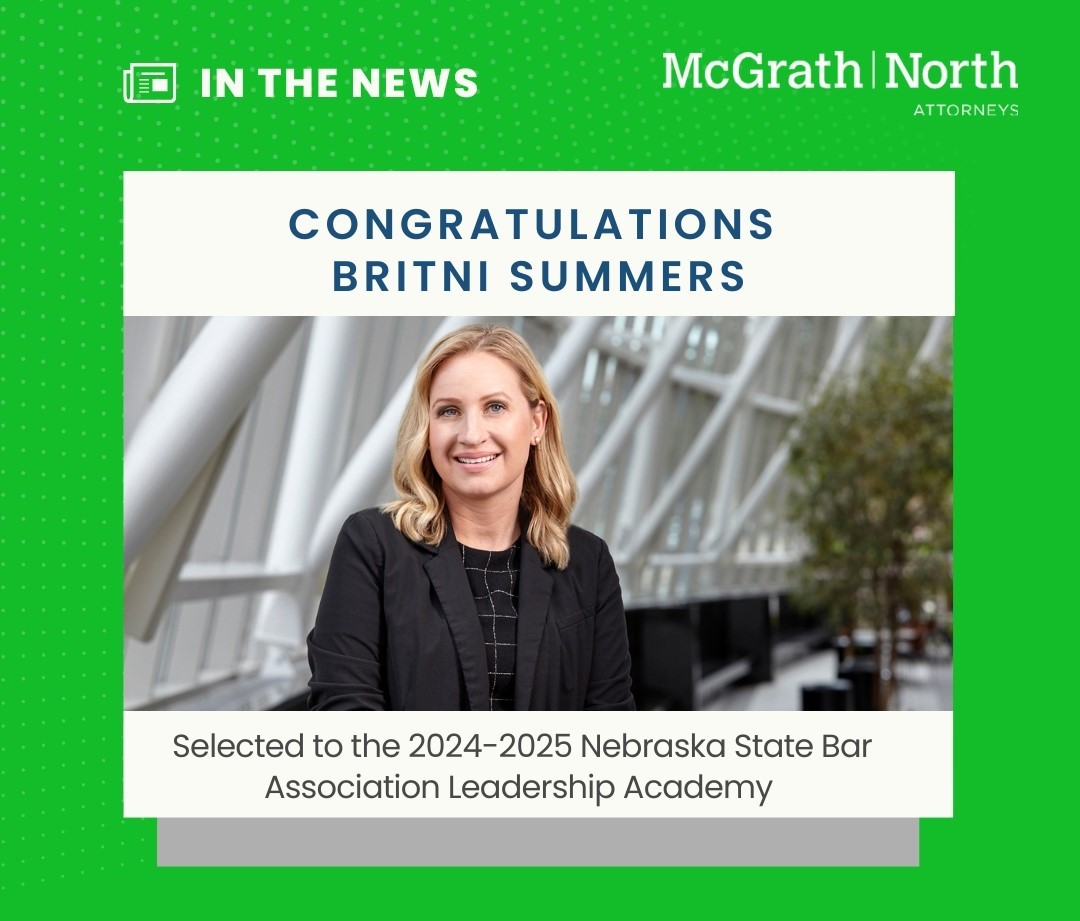
Education
- University of South Dakota School of Law (J.D., Sterling Honors, 2018)
- University of South Dakota (M.A., 2017)
- Creighton University (B.A., 2007)
Admissions
- Nebraska (2018: Sustaining Member)
- Iowa (2020)
- South Dakota (2022)
- U.S. District Court, District of Nebraska (2019)
- U.S. District Court, Northern District of Iowa (2020)
- U.S. District Court, Western District of Pennsylvania (2023)
- U.S. District Court, Southern District of Iowa (2023)
- U.S. District Court, District of South Dakota (2024)
- U.S. Court of Appeals, Eighth Circuit (2022)
- U.S. Court of Appeals, Third Circuit (2023)
News
More NewsMasters Series - June 11, 2025
This week, we proudly hosted our Masters Series seminar, bringing together over 90 attendees from 53 companies to dive deep into the complexities of leave and benefits management. The session, titled "Leave and Benefits A to Z: Navigating State Leave Laws, the FMLA, ADA, Benefit Coordination, and Beyond," provided valuable insights and practical strategies to help organizations stay compliant and support their employees effectively.
READ MORE
Events
More EventsAlerts
More AlertsNebraska Paid Sick Leave Deadline Is Near: Stay Ahead with NE DOL's Latest Guidance
The Nebraska Department of Labor (NE DOL) has released model workplace notice and poster materials to help employers comply with the amended Nebraska Healthy Families and Workplaces Act (NHFWA) by the upcoming September 15 deadline. At the same time, the NE DOL quietly updated its FAQs, offering further clarification on several key provisions of the amended law (see our earlier Alert for details on the amendments to the NHFWA). Below, we highlight the most important takeaways from the newly issued notice and poster, along with the accompanying FAQ guidance.
READ MORE
The OBBB's Impact on Employee Benefits and Executive Compensation:
The One Big Beautiful Bill (OBBB), signed into law on July 4, 2025, delivers significant updates to employee benefits. Most notably, it expands HSA eligibility, increases dependent care FSA limits (finally!), makes permanent student loan repayment assistance, solidifies paid family and medical leave employer tax credits, includes updates for measuring executive compensation taxable caps, and introduces employer contributions to “Trump Accounts” (i.e., investment accounts for children). Below is a breakdown of these updates that could significantly affect how employers offer employee benefits in the years ahead.
READ MORE
Publications
More PublicationsIRS Releases Final And Proposed Regulations On RMDs
The IRS released much-anticipated regulations concerning required minimum distributions (“RMDs”) from retirement plans. The retirement industry has wrestled to adapt to legal changes concerning RMDs brought on by the SECURE Act of 2019 and 2022’s SECURE 2.0. Both final and proposed regulations were released by the IRS on July 18, 2024. The final regulations reflect SECURE Act and SECURE 2.0 changes affecting retirement plan participants and IRA owners, as well as their beneficiaries. The proposed regulations address additional RMD changes under SECURE 2.0.
READ MORE
Planning To Leave Your Employment And Compete? Don't Forget About Your Duty Of Loyalty
When employees decide to leave their employer and engage in competition, they frequently overlook their duty of loyalty. Absent a non-compete or non-solicitation restriction, an employee may believe that he or she can freely engage in discussions with clients and customers regarding their intention to leave employment and engage in a competitive business.
READ MORE
- American Bar Association
- Eighth Circuit Bar Association
- Iowa State Bar Association
- Nebraska State Bar Association
- Omaha Bar Association
- The Robert M. Spire American Inn of Court
- Law Clerk, Hon. Roger L. Wollman, U.S. Court of Appeals for the Eighth Circuit
- Eighth Circuit Bar Association Board of Directors
- NSBA Labor Relations and Employment Law Executive Committee
- Managing Editor, South Dakota Law Review
- Seven CALI Awards
- Gavel Award – Outstanding Student by Faculty
- University of South Dakota School of Law Trial Team
- NALSA Moot Court
- 1st Place Award – South Dakota Law Review Write-on

